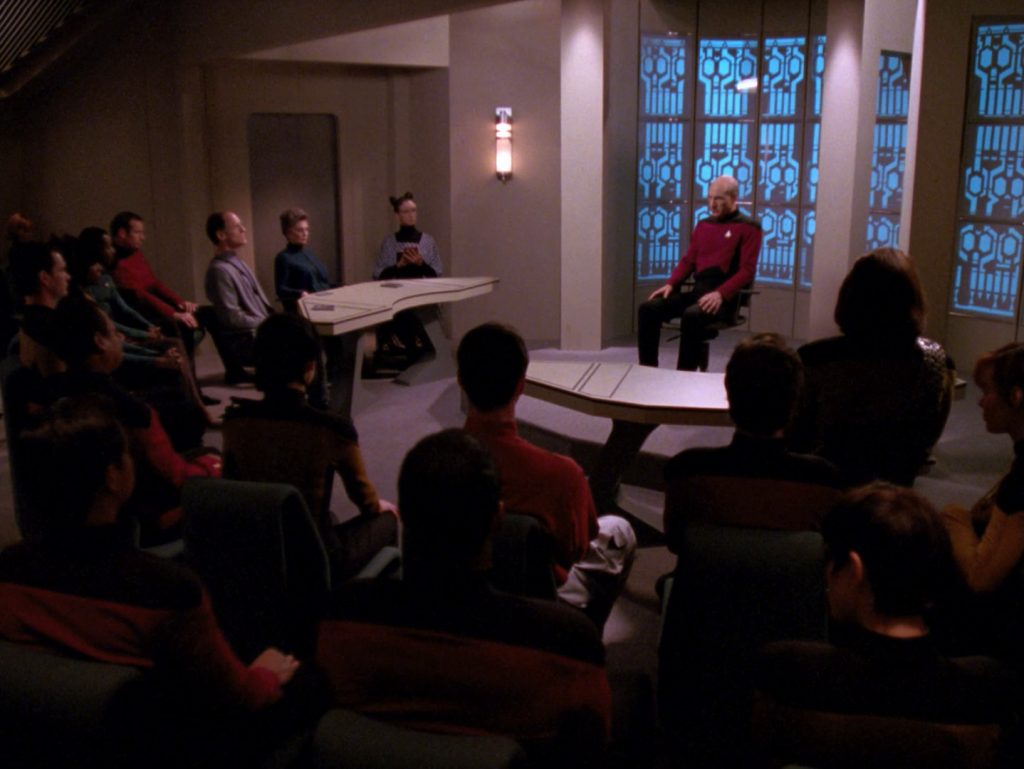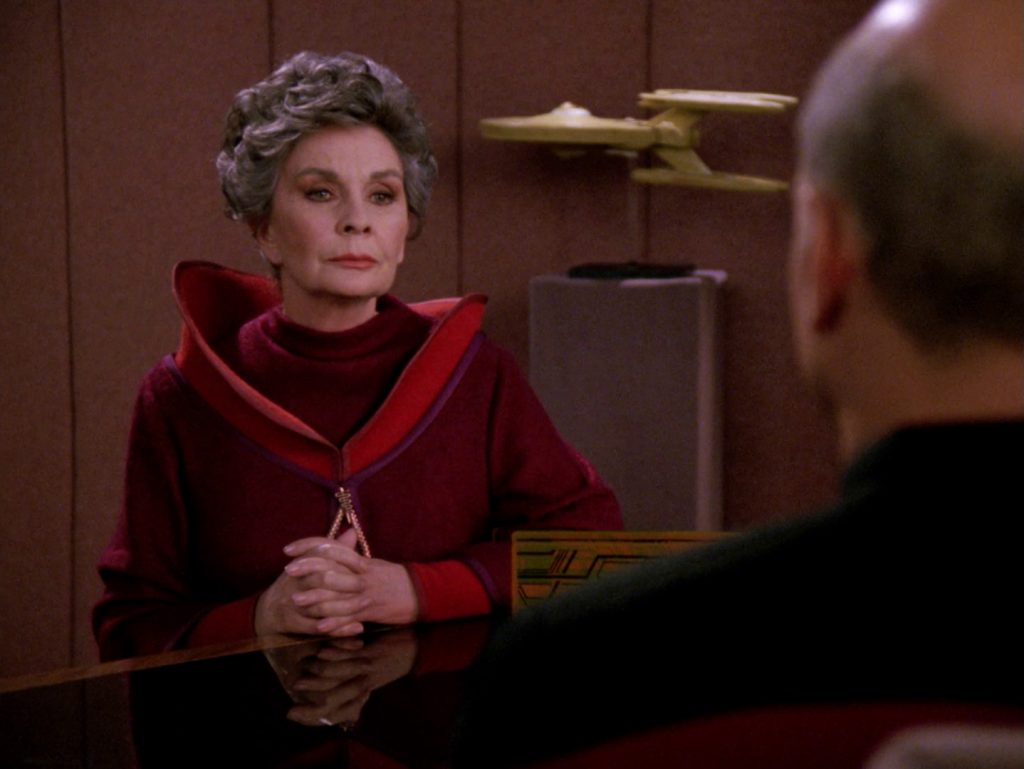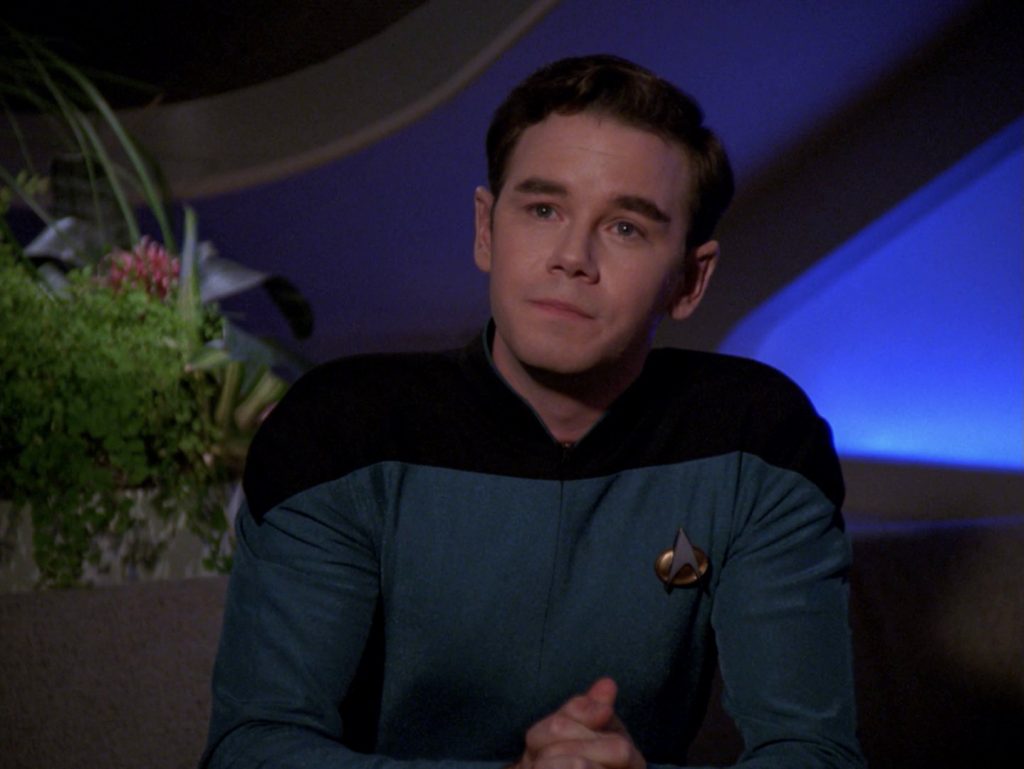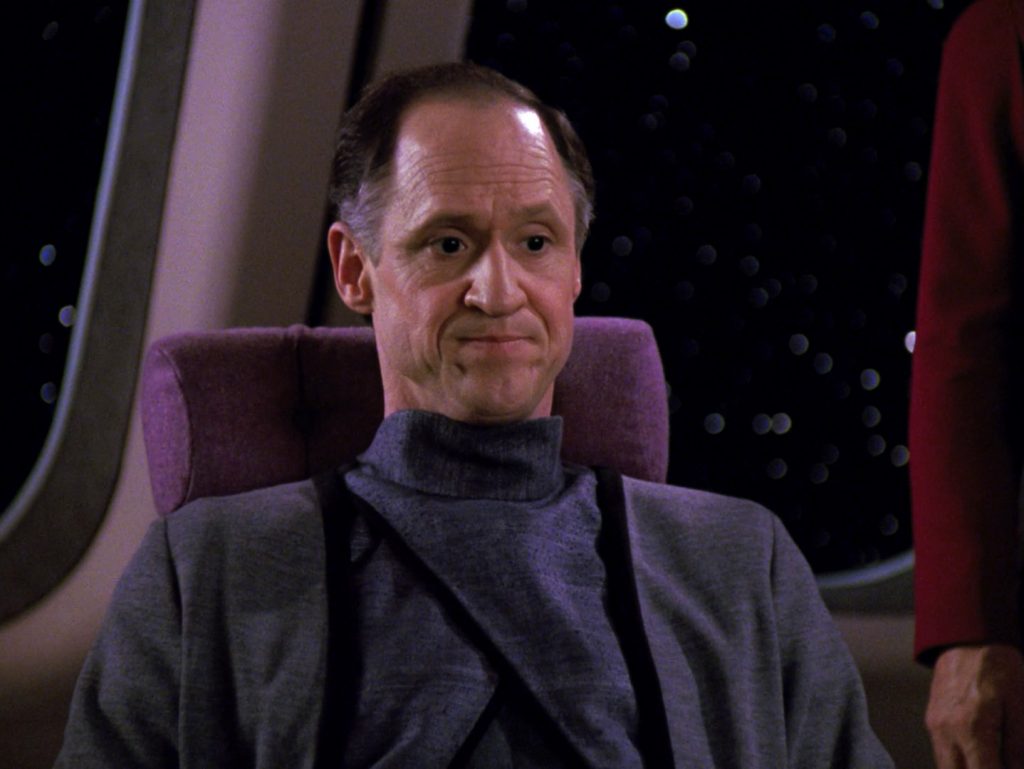Star Trek is an enormous and complex cultural entity whose impact on politics, technology, and storytelling are undeniable. For half a century, it has appealed to a vast and varied audience, and it means something a little different to each viewer. In this season of Infinite Diversity, Deadshirt founder and Trek superfan Dylan Roth explores individual Star Trek episodes and films, each with a different companion, to expand our understanding of this rich fictional universe and the one in which we live.

“With the first link, the chain is forged. The first speech censured, the first thought forbidden, the first freedom denied—chains us all irrevocably.”
– Captain Jean-Luc Picard takes a stand against creeping fascism
Dylan: My guest for this installment of Infinite Diversity is writer and sci-fi enthusiast Rachel Stevens! Rachel, can you tell our readers a little about yourself and your relationship to Star Trek?
Rachel: Hi! I’m a gay trans woman who moved to Seattle from Michigan. I have to cop to feeling skeeved out about some of DS9 & Star Trek‘s”representation” with regard to LGBT folk—the parasites that change bodies and keep memories, the race “without” gender that Riker met, the fact that some of the first gay representation was in the eeeeeevil mirror universe. I do still adore Trek, though—I first started watching it in the mid aughts in high school with TNG and Voyager on Spike reruns, and I also saw episodes of TOS via WGN. I loved the camp and optimistic depictions of our future space exploration. I grew up with silver age Marvel comics and Isaac Asimov, folks trying to entertain and impart humanistic morals with loose interpretations of science is something I’ve lived with almost my entire life.
I admit I didn’t see any episodes of DS9 til later in life at partner’s behest, which felt like I would have liked it more as science fiction that wasn’t Trek. It’s just so critical of the Federation—but that’s why it’s adored. It’s with that lens I watched the episode I’ll be discussing with Dylan.
“The Drumhead” (TNG)
Season Four, Episode Twenty-One
Originally aired April 29th, 1991
Written by Jeri Taylor
Directed by Jonathan Frakes
Conspiracy?
Dylan: We join this story in what feels like the second or third act—J’Dan, a Klingon exchange officer who the audience has never met before, is being interrogated for the suspected sabotage of the Enterprise’s warp engine, which suffered a minor but nearly catastrophic explosion before the episode began. Evidence suggests that J’Dan is also spying for the Romulans. Backed into a corner, J’Dan quietly suggests that his fellow Klingon Worf (who’s currently excommunicated from the Empire due to his father’s alleged treason) could benefit from helping him escape. Worf takes this insult to his honor as well as you might expect, and promises to prove J’Dan’s guilt no matter what it takes.
Rachel: The explosion needs to be investigated, resulting in Admiral Norah Satie and her and entourage being brought on board. Worf’s Klingon heritage is brought up as cause for distrust, but he’s deemed trustworthy despite initial fears by the admiral’s Betazoid companion, Sabin Genestra. The subsequent investigation draws attention to a part-Vulcan member of the crew, Simon Tarses, who administered J’Dan’s medical injections. Picard wants the crewman left alone, but Satie’s Betazoid insists otherwise.
Dylan: During Satie’s interrogation, J’Dan admits to spying for the Romulans but denies any involvement in the warp core explosion. Determined to learn who’s responsible for the sabotage, Satie and her Betazoid companion lean hard on Crewman Tarses despite all of the evidence against him being purely circumstantial. Sabin, using his Betazoid gifts, becomes certain that Tarses is hiding something, and with Worf in their corner, they continue to publicly badger Tarses until he’s forced to confess his secret: he lied on his application to Starfleet, he’s not part-Vulcan but part-Romulan. Which still doesn’t make him guilty of conspiracy, just of being afraid of prejudgement based on his heritage.
Rachel: Picard is pissed and demands Satie stop using the Betazoid in what is increasingly becoming obvious as a witch hunt, but is only called out for the use of a Betazoid himself with Troi. Satie reveals she’s been in contact with Starfleet this whole time, and soon it’s Picard’s turn at the stand. Things escalate, with Worf’s father [a falsely convicted Romulan collaborator himself] being referenced again as reason to distrust him, and Worf, who’d been cooperating this entire time, is agog.
Dylan: On top of everything else, the incident with the warp core is determined to have been an accident—yes, J’Dan was a Romulan spy, but there’s no evidence that there were ever any co-conspirators amongst the crew. But still Satie won’t let up, so Picard, during his own public interrogation, turns the tables on Satie, shaming her for her fear-mongering and destroying the credibility of her investigation. Satie leaves the Enterprise in disgrace, leaving Picard and an ashamed Worf to pick up the pieces.
Scout Finch Grew Up and Now She’s Mean

Her father was a famous progressive litigator. Now, she’s the high-collared harbinger of doom.
Dylan: Our main guest star this week is Jean Simmons as Admiral Norah Satie. Satie interests me because she’s the living embodiment of confirmation bias—Starfleet Command is certain enough that there’s a conspiracy aboard the Enterprise that they actually bring Satie (a decorated investigator) out of retirement to prove it. I get the impression that, for her, she’s single-mindedly dedicated to finding a conspiracy because that’s why she’s here. That’s her mission. If she doesn’t find one, then she’s failed. And she’s not the kind of person who can stand the perception at having failed at something, not when she’s living in the shadow of her legendary father, who evidently trained her from birth to win arguments at any cost.
Rachel: The Admiral has an incredible outfit that my partner described like a fish mascot costume without eyes, heh. She reminded me of Umbridge in Harry Potter, to be honest, I didn’t have much sympathy for her—she was looking for a conspiracy and I am not feeling up for allowing inquisitors to pull my heartstrings without good reason. Characters obsessed with justice, the law, their own code can absolutely be compelling antagonists or sources of conflict, but she felt too one-note to me. She’s no Ultra Magnus, Duly Appointed Enforcer of the Tyrest Accord. We know she’s wrong as the audience because we have seen the context for the incidents she brought up against Picard.
Dylan: I think the writers tried to give Umbridge (shit I’ll never unsee that now) Satie a degree of legitimacy by having Worf align with her, except Worf is very frequently presented as being super wrong a lot of the time throughout Next Gen. I think having someone usually level-headed, like Geordi, get sucked in by Satie’s law and order schtick might have made for more interesting drama. Picard makes a point to Worf at the end of the episode that Satie isn’t a mustache-twirling villain and he shouldn’t feel too bad for having sided with her, but you’re right that she plays as Lawful Evil from the word “go.” The best attempt at creating sympathy for her is in her family story—she’s a freaking Starfleet Admiral but every conversation she has is about her famous dad. I would have like to see that deconstructed a little more, maybe allow a little more visible resentment to peek through her reverence for the late Judge Satie. What can she possibly do to live up to him? Uncover a massive conspiracy, maybe?
Rachel: Your ideas could have worked, frankly I had similar thoughts.
“The Drumhead” Hits Close to Home, but Maybe Not Close Enough?
Rachel: It didn’t have as much bite as it could have had if it straight up mentioned America’s anti-communist trials, but the message still screams relevant today considering our current political climate—American government is pushing further right within both political parties in power, and fascism is encroaching on the Western world all over.
Dylan: In the real world, given recent events, I agree that we can’t afford to avoid specifically pointing out the way modern figures’ behavior parallels those of historical monsters. But personally, I tend to like when sci-fi stories let the audience connect the dots between the fictional allegory and its real-world parallel, so omitting a direct reference to HUAC didn’t bother me.
Rachel: You’re not wrong, but If they can name drop witch trials and military trials, they could at least flat out use the word communism even without referring to McCarthy or HUAC.
Thought Detectives
Dylan: “The Drumhead” is one of the only Trek episodes to actually address the ethical repercussions of employing mind-readers on your ship. Empathic Human/Betazoid Counselor Troi is constantly monitoring the emotional states of the crew, and frequently uses her abilities to advise the Captain during tense situations. But when Satie brings her own full-Betazoid telepath aide to take part in the conspiracy investigation aboard ship, Picard is uncomfortable. When he protests this to Satie, she turns the question right around on him, and the question doesn’t really get answered. It makes me wonder what the rules are about this on Betazed, where nearly everyone is some degree of telepathic.
Rachel: As a standalone episode it fails to really take Picard or Troi to task—maybe if I knew that this was the beginning of an arc that led to a shake up in the formula for TNG’s storytelling the rest of the season, that would be one thing. I did like that Picard admitted fault and vowed to do better in the future, but, eh.
Dylan: Yeah, we never see any follow-up to that idea. I can’t recall there being any change in Picard or Troi’s behavior on this matter in future stories. Like most TNG episodes, the events of this story are pretty much never mentioned again, which is a real shame. Maybe if this had been a DS9 story, we might have seen some fallout.
Rachel: It’s been ages since I’ve seen any Star Trek, so getting a chance to watch an episode for the purposes of critique was pretty fun and different. It wasn’t perfect, but it had its heart in the right place—which is pretty much why I love it as a storytelling vehicle.
Further Viewing/Reading:
Dylan: Sadly the only thread that gets picked up from this episode is the idea of a Romulan/Klingon alliance; Season Four ends with “Redemption,” where the Romulan-backed Duras family makes a play for control over the Klingon Empire. It’s a pretty solid Worf-centric two parter. If you want to see the Federation descend into more insane paranoid witch-huntery, visit DS9’s “Homefront” and “Paradise Lost.” Rachel, are there any works in particular outside of Trek that you feel did a better job with some of the themes explored in “The Drumhead?” You mentioned a Transformers story earlier…
Rachel: More Than Meets The Eye /in general/ approaches left wing political critique like this in detail, a few arcs come to mind (Shadowplay, Remain in Light, Elegant Chaos) regarding rot in the establishment and what they’ll do to keep control/make up for what they see as past mistakes. Particularly in the era before the Great War in IDW’s fiction, when the Decepticons actually have a cause for civil unrest beyond violence for its own sake.
Infinite Diversity will return in two weeks with a new guest! Follow @DeadshirtDotNet on Twitter to keep up with what’s new here on Deadshirt, and feel free to tweet @DylanRoth with suggestions for future topics for Infinite Diversity, or just to talk about Trek. He truly never gets tired of that.



